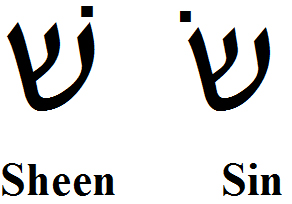
 |
Freethought & Rationalism ArchiveThe archives are read only. |
|
|
#41 |
|
Veteran Member
Join Date: Jun 2010
Location: seattle, wa
Posts: 9,337
|
There is a tendency in modern Judaism to 'psychoanalyze' the narrative. Nevertheless 'Ish' appears as a 'higher Self' figure.
http://www.clevelandjewishnews.com/f...a4bcf887a.html |
|
|
|
|
#42 | |
|
Veteran Member
Join Date: Jun 2010
Location: seattle, wa
Posts: 9,337
|
Listen carefully to the argument of Tertullian in Against Praxeas - Jesus is the ish in Genesis 32:
Quote:
|
|
|
|
|
|
#43 |
|
Contributor
Join Date: May 2010
Location: Babble Belt
Posts: 20,748
|
Two questions:
1) I've always been taught that the difference in pronunciation between 'sin' and 'shin' depends on the diacritical marks, not the context within the surrounding letters. By this rule, איש could be pronounced either 'ees' or 'eesh,' depending on the placement of the diacritic over the letter:  How do you reconcile this with the text quoted above, " ‘man’ is written with three letters aleph, iod, sin (so that it is pronounced is)"? 2) The phrase "son of man" appears in numerous places in the Tanakh, and seems to my untrained eye be pretty straightforward in meaning: male human child. What historical evidence exists to suggest that this is a reference to the son of a god named "man"? ETA: I understand the Rabbinical references to the "ish" who appears many times in Genesis (to talk with Abram, or to wrestle with Jacob, for example), it's specifically the "son of man" phrase that has my brain itching. |
|
|
|
|
#44 | ||
|
Veteran Member
Join Date: Jan 2008
Location: Latin America
Posts: 4,066
|
Quote:
Another possibility concerning Marcion is that he at one time led a small christian congregation in Palestine. According to Hermann Detering , Lucian satirized Marcion in his Passing of Peregrinus. If Detering is right then the following quote concerning “Proteus” is actually about Marcion. Quote:
|
||
|
|
|
|
#45 |
|
Veteran Member
Join Date: Jun 2010
Location: seattle, wa
Posts: 9,337
|
Even Detering likes my solution better - Proteus = Polycarp
|
|
|
|
|
#46 |
|
Veteran Member
Join Date: Jun 2010
Location: seattle, wa
Posts: 9,337
|
I have always had two minds on Justin's silence:
1. Justin rejected Paul 2. Justin thought Paul was so sacred and so went unmentioned (= secret) |
|
|
|
|
#47 | |
|
Veteran Member
Join Date: Jun 2010
Location: seattle, wa
Posts: 9,337
|
Quote:
|
|
|
|
|
|
#48 | ||
|
Contributor
Join Date: May 2010
Location: Babble Belt
Posts: 20,748
|
Quote:
Thanks. |
||
|
|
|
|
#49 |
|
Veteran Member
Join Date: Jun 2010
Location: seattle, wa
Posts: 9,337
|
I don't know if yashar really is the root. Just what people say
|
|
|
|
|
#50 | ||
|
Veteran Member
Join Date: Jun 2010
Location: seattle, wa
Posts: 9,337
|
I am beginning to wonder if איש on its own in Genesis 32 and other verses takes on the sense of the being as anonymous 'stranger' - a la the (indirect) descriptions of the Marcionite divinity in the Church Fathers.
In a sentence in Hebrew, if you simply identify an איש as the actor you are essentially saying 'the stranger' as we read: Quote:
Quote:
http://books.google.com/books?id=-wn...%27ish&f=false |
||
|
|
| Thread Tools | Search this Thread |
|